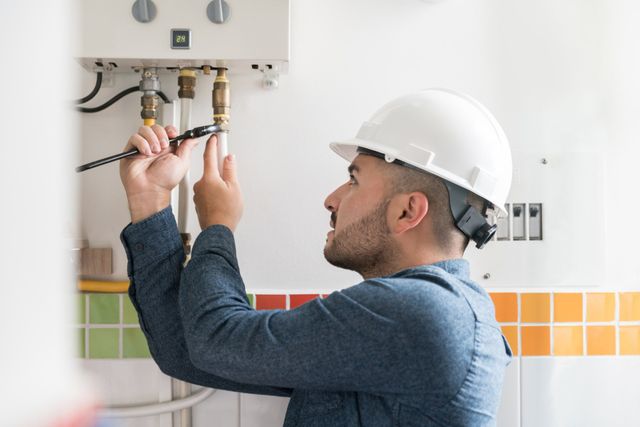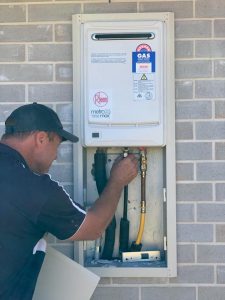Handling the Routine Hot Water Heater Crisis Events
Handling the Routine Hot Water Heater Crisis Events
Blog Article
We have uncovered this article relating to Common Hot Water Heater Problems directly below on the internet and decided it made good sense to relate it with you in this article.

A hot water heater is among one of the most essential standard appliances that can be discovered in a house. With hot water heater, you do not need to go through the anxiety of heating water manually every single time there is a requirement to take a bath, do the laundry, or the recipes. Nonetheless, there is always a possibility that your hot water heater would act up similar to a lot of mechanical devices.
It is very important to note any kind of little malfunction and tackle it rapidly prior to things get out of hand. Most times, your water heater begins to malfunction when there is a build-up of sediments as a result of continuous usage. As a precaution, regular flushing of your water heater is recommended to stop debris accumulation and prevent useful failure.
Common hot water heater emergency situations as well as just how to manage them
Dripping hot water heater container.
A leaking container could be an indication of corrosion. It can create damages to the floor, wall as well as electrical tools around it. You can also go to danger of having your house swamped. In this situation, you must shut off your water heater, enable it to cool down, as well as carefully seek the resource of the issue. Sometimes, all you need to do is to tighten up a couple of screws or pipe links in cases of minor leakages. Yet if this doesn't function as well as the leak lingers, you may need to utilize the services of a service technician for an ideal substitute.
Rising and fall water temperature.
Your hot water heater could begin generating water of various temperatures usually ice scalding or cool warm. In this scenario, the first thing you do is to make sure that the temperature is readied to the desired degree. If after doing this, the water temperature level keeps altering during showers or other tasks, you may have a malfunctioning thermostat. There may be a need to change either the thermostat or the home heating device of your hot water heater.
Inadequate hot water
Taking care of an insufficient supply of hot water can be irritating. It may be that the water heater can not sustain the warm water need for your house. To take care of this trouble, you can try to readjust your heater's temperature dial and wait on a couple of mins. If the trouble lingers, you can request for the aid of a specialist plumber. You could upgrade your water heating system to one with a bigger capability.
Tarnished or stinky water
You require to recognize if the concern is from the storage tank or the water resource when this happens. If there is no funny odor when you run cold water, after that you are particular that it is your hot water heater that is faulty. The smelly water can be caused by corrosion or the buildup of bacteria or debris in the hot water heater storage tank. You can attempt flushing out your container or changing the anode if the problem lingers as soon as you notice this. The feature of the anode is to clean out microorganisms from your storage tank. Since the anode pole replacement requires an extensive expertise of your water heating unit, you will need the aid of a specialist.
Final thought
Some house owners disregard little warning and minor faults in their hot water heater unit. This only brings about further damages as well as a feasible full breakdown of your appliance. You must handle your hot water heater mistakes as soon as they come near avoid even more expenditures and unneeded emergency problems.
With water heating systems, you don't require to go via the anxiety of heating water by hand every time there is a requirement to take a bath, do the laundry, or the dishes. Your water heater might start generating water of different temperatures generally ice chilly or scalding warm. It may be that the water heating system can't sustain the warm water demand for your home. If there is no amusing smell when you run cool water, then you are particular that it is your water heater that is damaged. The smelly water can be created by corrosion or the buildup of germs or sediments in the water heating unit storage tank.
Water Heater Burst: Why This Happens And What To Do Next
Water Heater Explosion Warning Signs
Since storage water heaters are made of metal and store large volumes of heated water, they carry an increased risk of leaking or even exploding as they begin to rust at the fittings and seams over time. If the thermostat controlling the water temperature within the tank is faulty, or if mineral buildup inside the water heater prevents the thermostat from sensing the water’s temperature correctly, the water could become overheated. This will expand its volume within the tank, causing it to press at the tank’s fittings and seams. If these fittings and seams are rusted or corroded, the pressure could result in a leak or even an explosion.
Here are some risk factors and warning signs of an increased risk of water heater leak or explosion:
Your water heater is more than 10 years old. Your water heater makes clanking, banging or rumbling noises as it heats up, indicating that sediment has built up and hardened inside the tank. There is visible rust on the outside of the water heater, especially located at the pipe fittings or the seams that run down the tank. There is rusty water coming from your water heater, indicating that there may be rust building up inside. Your water heater is leaking, which could indicate either a crack somewhere in the tank or a malfunctioning temperature-and-pressure (T&P) relief valve. What To Do When Water Heater Leaks
If you find water dripping or seeping out of your water heater, or pooling around it, it means your water heater is leaking. If you find a leak, it may be best to call a plumbing professional to diagnose the problem and determine how best to handle it. If you choose to tackle it on your own, there are a few things you can do.
TURN OFF THE POWER
Next, shut off the power to the hot water tank at your home’s electrical breaker box. If you don’t shut off the power, the heating elements within the tank could continue to stay hot, which could pose a fire risk.
If you have a gas-powered water heater, you’ll also need to shut off the gas line leading into the tank.
FIND THE LEAK
Now it’s time to determine where the leak is coming from. Likely locations are the T&P valve, the drain valve or one of the pipes or fittings that feed into the top of the tank. If you see any rust or corrosion on the outside of your water heater’s tank, pipes or fittings, these could also be the source of the leak.
REPAIR THE LEAK
Once you determine the source of your water heater leak, you’ll have a better idea of what steps you need to take to fix the problem. It may be a simple fix—such as using a wrench to tighten fittings or replacing the T&P valve—but it may be something more complicated. You may even need to drain the tank, remove the water heater and install a new one.
https://www.abchomeandcommercial.com/blog/water-heater-burst/

Do you appreciate more info about Common Hot Water Heater Problems? Place a remark down the page. We'd be interested to see your opinion about this review. We hope that you visit us again in the near future. Remember to take the opportunity to distribute this blog post if you enjoyed it. I appreciate reading our article about Common Hot Water Heater Problems.
Top plumbers, call! Report this page